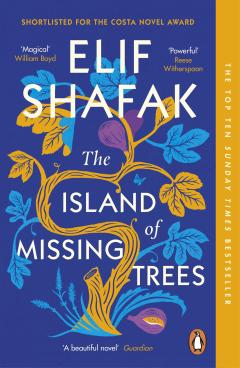The Island of Missing Trees

Fiction with a sense of place
Elif Shafak, as an author of both literary fiction and political/social commentary, has managed to create in her work, The Island of Missing Trees, a novel of great lyrical prose and beautiful imagery in her evocation of Cyprus, its history, landscape and culture.
The story packs a punch in covering a lot of ground in terms of combining personal and political themes with descriptions of nature and the interconnectedness between humans and the natural world. From the outset, the reader is introduced to the young lovers, Kostas, who is Greek Christian and Defne, of Turkish Muslim heritage. They are eighteen years old in 1974 when tensions run high between the two communities in Cyprus. The Republic of Cyprus was formed following the island's independence from Britain in 1960. The volatile situation is about to lead to war and to the partition of the island. The only place the couple can meet is at a tavern called The Happy Fig Tree. The proprietors, Yiorgos, a Greek Cypriot, and his partner, Yusuf, Turkish Cypriot, are sympathetically eager to provide the young couple with a safe meeting place.
It is within this backdrop of the tavern that a fig tree is positioned at its very centre, but the tree also takes centre stage within the novel's narrative. The fig tree bears silent witness to happenings both within the tavern and to the broader societal context of ethnic violence and division, accumulated grief and loss, the curse of memory and weighty silences, inherited pain, inter-generational trauma and migration, home, exile, identity and belonging and ultimately, love. Yes, this novel has it all and is very ambitious in its depiction of the many social and cultural themes within its plot and dialogue.
The roots and branches of the fig tree symbolise how the past and present intertwine. It’s a story of two individuals whose love transcends societal, cultural and geographic boundaries. Shafak combines a storyline of love, and tragedy, within a rich and complex Cypriot history. If not a committed fan of Shafak's work, I may have had some initial reservations in reading this novel, particularly when discovering that part of the book's narration is drawn from the perspective of a fig tree. However, in demonstrating her genuine talent as an writer of literary fiction, she successfully blends a storyline between the personal and the political, switching between different timelines, narrators and locations (Cyprus and present day London) and also, successfully portraying the impact of war on both Greek and Turkish communities. She manages to bring our attention to the benign influence of nature, how climate change impinges on our eco-consciousness, and the consequences of human activity on plant life and our ecosystem. Throughout, the narrative holds an optimistic note, bringing a greater appreciation of our natural world and the interconnectedness and renewal of nature and a deeper insight into human nature and family ties.
'...we only grasp bits and pieces, each of us, and sometimes your bits and pieces do not match mine and then what's the use in talking about the past, it'll only offend everyone. You know what they say, keep the tongue in your mouth a prisoner. Wisdom consists of ten parts: nine parts of silence, one part of words.'












